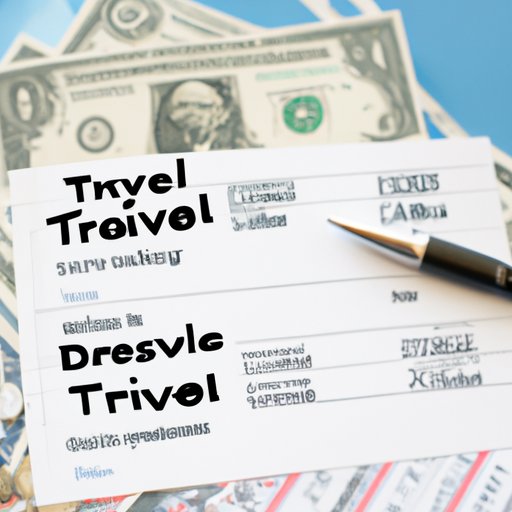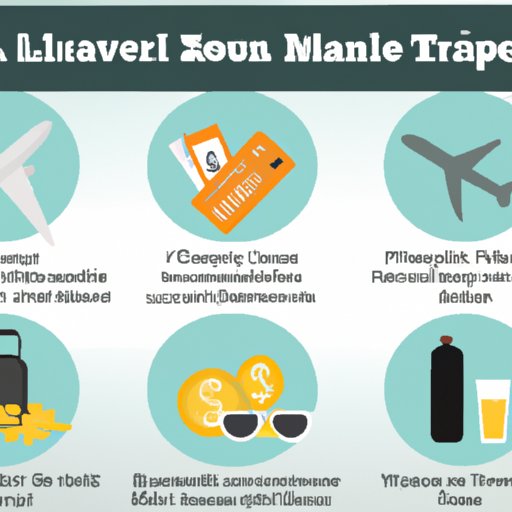Introduction
Traveling is an incredible experience that can enrich our lives in many ways. But one of the most important aspects of any journey is understanding the costs associated with it. Knowing what travel expenses you’ll have to pay for, and how much they’ll cost, will ensure that you stay within your budget and make the most of your trip.
The term “travel expenses” refers to the costs incurred when planning and taking a trip. These expenses can include airfare, accommodations, transportation, food, shopping, and activities. By understanding these costs ahead of time, you can plan accordingly and make sure you don’t overspend.

Comparing Travel Expenses of Different Destinations
When deciding on a destination, it’s important to consider not only the attractions and experiences that each place has to offer, but also the cost associated with visiting them. Different destinations will have different costs, so it’s important to do some research and compare costs before making your final decision.
Factors that Influence Travel Expenses
There are several factors that can influence the cost of visiting a destination. These include the cost of flights, the cost of accommodation, the cost of transportation, the availability of free attractions, and the cost of food and other necessities. It’s important to consider all of these factors when comparing the costs of different destinations.
How to Compare Costs of Different Destinations
When comparing the costs of different destinations, it’s important to look at the total cost of the trip, rather than just the cost of flights or accommodation. Consider the cost of flights, accommodation, transportation, food, shopping, and activities. It’s also a good idea to factor in the cost of any visas or vaccinations that may be required for your trip.
Examples of Different Destinations and their Associated Costs
To give you an idea of the range of costs associated with different destinations, here are a few examples:
A trip to London, England may cost around $1,500-$2,500 for a week-long stay, including flights, accommodation, transportation, food, and activities.
A trip to Tokyo, Japan may cost around $3,000-$4,500 for a week-long stay, including flights, accommodation, transportation, food, and activities.
A trip to Cancun, Mexico may cost around $700-$1,200 for a week-long stay, including flights, accommodation, transportation, food, and activities.

Breaking Down the Most Common Travel Expenses
Now that you know how to compare the costs of different destinations, let’s take a closer look at the most common travel expenses.
Airfare
Airfare is usually the most expensive part of any trip. The cost of flights can vary greatly depending on the destination, the airline, and the time of year. It’s important to do some research and compare prices before booking your flights.
Accommodations
Accommodations are another major expense when traveling. The cost of accommodations can vary greatly depending on the type of accommodation (e.g., hotel, Airbnb, hostel, etc.), the location, and the time of year. Again, it’s important to do some research and compare prices before booking your accommodations.
Transportation
Once you’ve arrived at your destination, you’ll need to consider the cost of transportation. This could include public transportation (e.g., buses, trains, subways, etc.), taxis, car rentals, or even walking. Depending on your destination, some forms of transportation may be more cost effective than others.
Food
Food is another essential expense when traveling. The cost of food can vary greatly depending on your destination and where you choose to eat. Many cities have inexpensive local eateries that offer delicious meals at reasonable prices.
Shopping
Shopping is another popular activity when traveling. Whether you’re looking for souvenirs, clothing, or gifts for friends and family, the cost of shopping can add up quickly. Be sure to set a budget for shopping and stick to it.
Activities
The cost of activities can also add up quickly. Depending on your destination, there may be a wide variety of activities available, from sightseeing tours to museum visits to outdoor adventures. It’s important to do some research and compare prices before booking any activities.
Tips for Keeping Travel Expenses Low
Understanding the costs associated with traveling is only half the battle; the other half is learning how to keep those costs as low as possible. Here are a few tips for keeping your travel expenses low:
Research Accommodation Options
Do some research to find the best deals on accommodations. Look for discounts, coupons, and special offers. Consider staying in hostels, camping, or couchsurfing to save money.
Take Advantage of Discounts
Many airlines, hotels, and attractions offer discounts or special offers, so be sure to look for these when booking your trip. You may be able to save money by booking your flights, accommodations, and activities in advance.
Use Public Transportation
Public transportation is often the cheapest way to get around. In many cities, it’s faster and more convenient than driving or taking a taxi.
Look for Free Attractions
Many cities have a variety of free attractions, such as parks, museums, galleries, and historic sites. Do some research to find out what free activities are available in your destination.
Don’t Overbuy Souvenirs
Souvenirs are a great way to remember your trip, but it’s easy to go overboard. Set a budget for souvenirs and stick to it.
How to Budget for Travel Expenses
Budgeting for travel expenses is an important part of any trip. Here are a few tips for creating a budget for your next trip:
Estimate Your Total Trip Cost
Start by estimating the total cost of your trip. Don’t forget to include the cost of flights, accommodations, transportation, food, shopping, and activities. Make sure to factor in any visa or vaccination fees as well.
Break Down Your Budget Into Categories
Once you’ve estimated the total cost of your trip, break it down into categories. For example, create separate budgets for flights, accommodations, transportation, food, shopping, and activities.
Create a Payment Plan
Finally, create a payment plan for your trip. Decide when you’ll pay for each expense, and set aside money for each payment. This will help you stay on track and avoid overspending.

Making Sense of Your Travel Expenses Through Bookkeeping
Bookkeeping is an important tool for understanding your travel expenses. Here are a few tips for tracking and analyzing your spending habits:
Track Your Expenses
Keep track of all your expenses throughout your trip. Make note of how much you’re spending on each category (e.g., flights, accommodations, food, etc.) and be sure to keep all receipts.
Categorize Your Expenses
Organize your expenses into categories. This will make it easier to analyze your spending habits and identify areas where you may be overspending.
Analyze Your Spending Habits
Once you’ve categorized your expenses, take a closer look at your spending habits. Identify areas where you can cut back and look for ways to save money in the future.
Conclusion
Travel expenses are the costs associated with planning and taking a trip. Understanding these costs ahead of time is essential for staying within budget and making the most of your trip. By researching destinations, breaking down common expenses, and tracking your spending habits, you can make sure you don’t overspend on your next adventure.
By following the tips outlined in this article, you can become a savvy traveler and save money on your next trip.
(Note: Is this article not meeting your expectations? Do you have knowledge or insights to share? Unlock new opportunities and expand your reach by joining our authors team. Click Registration to join us and share your expertise with our readers.)
